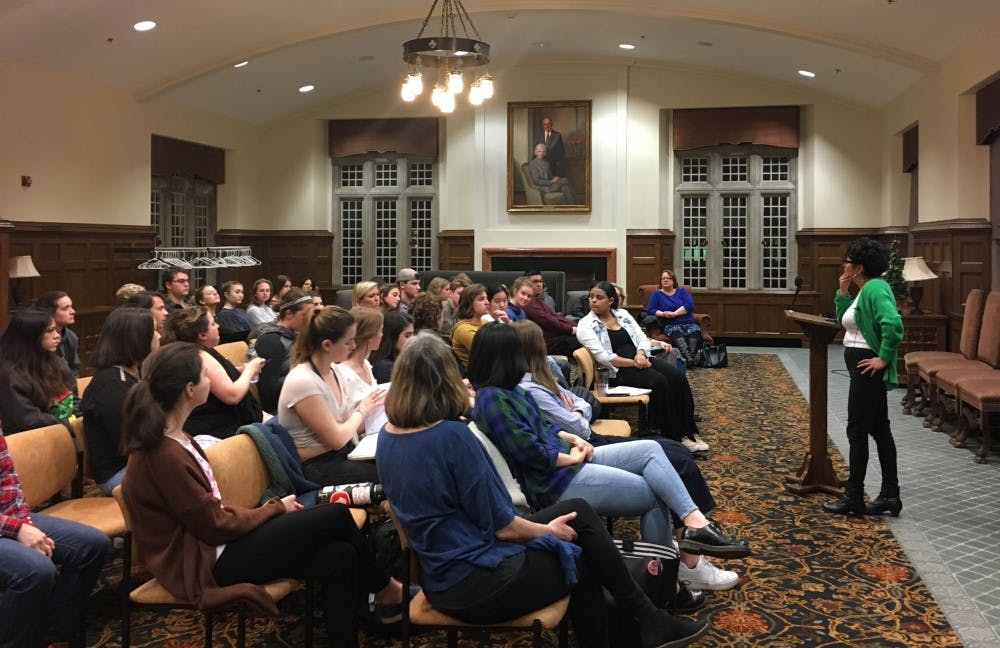On March 26, the WILL* program hosted renowned art activist Favianna Rodriguez, who spoke about changing culture through art, in the Brown Alley Room.
The WILL* website describes Rodriguez as a “transdisciplinary artist, cultural strategist, and activist… whose work and collaborative initiatives address migration, economic inequality, gender justice, and ecology.”
It cites Rodriguez's belief, which she discussed in her lecture, that social change requires centering art to “inspire, educate, and spur the imagination beyond the realm of politics.”
After a brief introduction by Holly Blake, director of WILL* and affiliated faculty member for women, gender and sexuality studies, Rodriguez began her candid lecture on "Reclaiming the Radical Imagination."
In her lecture, Rodriguez explored her identity as a Latinx woman and shared how her childhood in 1980s Oakland, California, shaped her view of the world. She shared that her immigrant parents’ high academic expectations for her led to her seeking an outlet for her creativity and voice, which she found in community art classes and her “chola” neighbor who drew classic cars. She mentioned questioning how her family's Latinx traditions, her early puberty, tall height, and brown skin fit alongside her white peers.
Rodriguez spoke to the immigration debates of the early '90s that mirror today’s domestic conflict, which led to the construction of a physical Mexican-American border. The media coverage of that debate inspired Rodriguez to question the impact culture has on people's outlook on the world.
“Culture is what surrounds us all the time,” she explained, "and it shows us what is normal and what is not."
Rodriguez described society as an ocean that changes through waves, and said that culture created the condition for change, citing Colin Kaepernick and the #MeToo movement as examples of how speaking out can trigger these waves.
In response to a question regarding the responsibility of disadvantaged individuals to educate others, Rodriquez said that she did not believe this was a responsibility to bear. She explained that some people may be unprepared, unwilling or feel unsafe sharing.
Instead, Rodriguez offered open mics, story circles, artwork and plays -- in which actors empathize with the story, the individual is distanced from the stress of sharing and the individual is also given ownership through directing -- as methods of expression that may take stress off the person.
She also emphasized the importance of shared experiences and gaining support in the healing process of trauma, whether that be through massages, cooking with allies or convening to heal together in safe spaces.
Rodriguez recommended several pieces of media following her prepared lecture. She recommended seeing Jordan Peele’s "Us," and urged that any time people saw Latinx, Black, Asian, indigenous, or Hispanic content creators, to show financial support. She herself listens to the New York Times's "Still Processing" culture podcast, "WHOREible Decisions," Adrienne Marie Brown’s "Pleasure Activism," Ali Wong’s comedy specials, STARZ’s "Vida" and Issa Rae’s "Insecure."
Enjoy what you're reading?
Signup for our newsletter
Rodriguez also recommended content that follows the Bechdel Test, as well as those who have non-white characters serving a role outside of the benefit of white characters and those without white male main characters.
"Our brains are like sponges,” she said, so consuming this content makes the viewer aware of new perspectives and provides the ability to question cultural norms.
She also spoke about not letting racial or other societal identities limit your self-expression.
“Identity is a place to start, but not where your journey ends,” Rodriguez said. She recommended "tell[ing] your story in a way that’s complicated," such as the life of her father as a Black Latinx non-religious immigrant rather than the stereotypical “machista.”
She emphasized her belief that the more one is able to share their story, the more they are opening up the imagination of others.
When asked her main advice for University of Richmond students, Rodriguez told The Collegian, “As young people, you’re in a really critical time of your life, where you’re being exposed to ideas that are going to shape the rest of your life."
She stressed that the more that “you can absorb and open up to different points of view, not only is it extremely educational and enlightening, but it also allows you to connect with different kinds of human beings in a very compassionate and empathetic level, and this going to help to solve some of the world’s problems.”
Rodriguez said she believed that the majority of the current problems plaguing the world were “caused by isolating from each other and trying to fill our hearts with non-transformative things, unlike connections with human beings.”
Sophomore Addison Swackhammer attended the lecture as a member of WILL*. Swackhammer said she had found it fascinating how Rodriguez explained the ways in which art and politics interact and shape each other, while also discussing pertinent social issues like reproductive rights.
Rodriguez’s lecture was followed by an interactive workshop led by her on the Westhampton Green from 3 to 4:30 p.m. on March 27, during which students could screen-print Rodriguez’s art onto posters provided by Studio T3 or onto other self-provided materials.
Rodriguez’s work and event schedule are accessible online as well as on her Instagram, Twitter and Facebook accounts.
Contact news writer Isabella Dumitrescu at isabella.dumitrescu@richmond.edu.
Support independent student media
You can make a tax-deductible donation by clicking the button below, which takes you to our secure PayPal account. The page is set up to receive contributions in whatever amount you designate. We look forward to using the money we raise to further our mission of providing honest and accurate information to students, faculty, staff, alumni and others in the general public.
Donate Now



